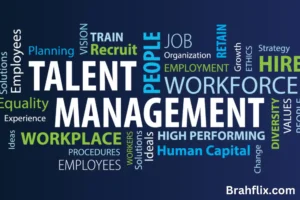Introduction
In today’s competitive business landscape, effective talent management has emerged as a crucial component of organizational success. Talent management encompasses a range of practices designed to attract, develop, retain, and optimize an organization’s human resources. The benefits of effective talent management extend far beyond simply filling positions; they encompass enhanced employee engagement, improved performance, and a robust company culture.
Key Takeaways
- Enhanced Employee Engagement: Effective talent management strategies increase job satisfaction and commitment.
- Improved Performance: Well-managed talent leads to higher productivity and better organizational outcomes.
- Strategic Workforce Planning: Aligning talent management with business goals drives long-term success.
1. Understanding Talent Management
Defining Talent Management
Talent management refers to the systematic process of recruiting, developing, and retaining employees to meet organizational goals. It involves identifying talent gaps, implementing training programs, and creating pathways for career advancement.
Components of Talent Management
- Recruitment and Selection: Attracting the right candidates who align with the company’s values and culture.
- Onboarding: Providing new hires with the tools and knowledge they need to succeed from day one.
- Training and Development: Continuous learning opportunities that enhance employees’ skills and career growth.
- Performance Management: Regular evaluations that help employees understand their contributions and areas for improvement.
- Succession Planning: Preparing for future leadership needs by identifying and nurturing potential leaders within the organization.
Importance of a Strategic Approach
A strategic approach to talent management not only improves employee retention but also ensures that organizations remain agile and responsive to market changes. By aligning talent management practices with business strategies, companies can leverage their human capital for competitive advantage.
2. Enhancing Employee Engagement
The Link Between Talent Management and Engagement
Employee engagement refers to the emotional commitment an employee has towards their organization. Engaged employees are more likely to be productive, motivated, and loyal. Effective talent management directly influences engagement levels.
Strategies to Boost Engagement
- Regular Feedback: Create a culture of open communication where employees receive constructive feedback and recognition.
- Career Development Opportunities: Offering training programs and clear career paths fosters a sense of investment in employees’ futures.
- Work-Life Balance: Flexible work arrangements and supportive policies contribute to overall job satisfaction.
Statistics on Engagement
According to a Gallup study, organizations with high employee engagement levels see 21% higher profitability and 17% higher productivity. This underscores the importance of effective talent management in fostering a committed workforce.
3. Improving Organizational Performance
The Impact of Talent Management on Performance
Effective talent management directly correlates with improved organizational performance. By strategically aligning talent with organizational goals, companies can enhance their overall productivity and efficiency.
Key Performance Indicators (KPIs)
- Employee Productivity: The output of employees often increases with targeted development programs.
- Quality of Work: Well-managed talent tends to produce higher-quality results due to enhanced skills and motivation.
- Innovation Rates: A culture of continuous learning and development fosters creativity and innovation among employees.
Case Studies of Successful Talent Management
Several organizations have successfully implemented talent management strategies that significantly improved their performance. For instance, Google invests heavily in employee development, resulting in consistent innovation and market leadership.
4. Driving Employee Retention
The Cost of Employee Turnover
High turnover rates can be costly for organizations. According to the Society for Human Resource Management (SHRM), replacing an employee can cost up to 150% of their annual salary. Effective talent management strategies are essential to retain top talent and minimize turnover.
Retention Strategies
- Competitive Compensation: Offering competitive salaries and benefits packages helps retain skilled employees.
- Recognition Programs: Implementing employee recognition programs can boost morale and loyalty.
- Career Advancement Opportunities: Providing clear pathways for advancement encourages employees to stay long-term.
Retention Statistics
Research from the Work Institute shows that 77% of employee turnover is preventable. Organizations that focus on effective talent management can significantly reduce attrition rates and associated costs.
5. Cultivating a Strong Company Culture
The Role of Talent Management in Culture
A strong company culture is essential for attracting and retaining top talent. Effective talent management practices help shape and reinforce this culture.
Building a Positive Culture
- Values Alignment: Ensuring that hiring practices align with the organization’s core values fosters a cohesive work environment.
- Employee Involvement: Encouraging employee participation in decision-making processes enhances ownership and commitment.
- Diversity and Inclusion: Creating a diverse workforce promotes a richer company culture and drives innovation.
Culture and Performance
A study by Deloitte found that organizations with a strong culture outperform their competitors by 200%. Talent management plays a crucial role in fostering a positive culture that drives success.
6. Fostering Leadership Development
Importance of Leadership in Talent Management
Leadership development is a key aspect of effective talent management. Cultivating strong leaders within the organization ensures a pipeline of capable individuals ready to take on critical roles.
Leadership Development Strategies
- Mentorship Programs: Pairing emerging leaders with experienced mentors helps develop leadership skills.
- Leadership Training: Providing targeted training programs equips future leaders with essential skills and knowledge.
- Cross-Functional Opportunities: Encouraging employees to take on roles in different departments broadens their understanding of the organization.
The ROI of Leadership Development
Investing in leadership development can yield significant returns. Research indicates that organizations with strong leadership development programs experience 29% higher profitability and 27% higher productivity.
7. Aligning Talent Management with Business Goals
The Need for Strategic Alignment
For talent management to be effective, it must align with the organization’s overall business goals. This alignment ensures that the workforce is prepared to meet current and future challenges.
Steps to Achieve Alignment
- Conduct Workforce Planning: Analyze current workforce capabilities and identify gaps.
- Set Clear Goals: Establish measurable goals for talent management that support broader business objectives.
- Regularly Review and Adjust: Continuously evaluate talent management practices to ensure they remain aligned with changing business needs.
Benefits of Strategic Alignment
Organizations that align talent management with business goals can improve overall performance, agility, and market competitiveness. This alignment facilitates a proactive approach to talent needs and challenges.
8. Utilizing Technology in Talent Management
The Role of Technology
Technology has revolutionized talent management practices. From applicant tracking systems to performance management software, digital tools streamline processes and improve outcomes.
Key Technologies in Talent Management
- Applicant Tracking Systems (ATS): Automate the recruitment process, making it easier to identify top candidates.
- Learning Management Systems (LMS): Facilitate employee training and development programs.
- Performance Management Tools: Enable continuous feedback and performance evaluations to enhance employee development.
Impact of Technology on Efficiency
According to a report by McKinsey, organizations that leverage technology in talent management can achieve up to 40% higher efficiency in their HR processes. Embracing technology can lead to significant time and cost savings.
9. Measuring the Effectiveness of Talent Management
Importance of Measurement
Measuring the effectiveness of talent management initiatives is essential for continuous improvement. Metrics help organizations understand what works and what needs adjustment.
Key Metrics to Consider
- Employee Engagement Scores: Regular surveys can provide insights into employee satisfaction and engagement levels.
- Turnover Rates: Monitoring turnover helps identify potential issues in retention strategies.
- Performance Metrics: Analyzing performance data can reveal the effectiveness of training and development programs.
Continuous Improvement
Organizations should view talent management as an ongoing process. Regularly assessing the effectiveness of strategies allows companies to adapt and respond to the evolving needs of the workforce.
FAQs
What is talent management?
Talent management refers to the systematic approach of recruiting, developing, and retaining employees to meet organizational goals.
Why is effective talent management important?
Effective talent management enhances employee engagement, improves performance, reduces turnover, and fosters a strong company culture.
How can organizations improve their talent management practices?
Organizations can improve talent management by aligning it with business goals, utilizing technology, and regularly measuring effectiveness.
What role does leadership development play in talent management?
Leadership development is crucial for preparing future leaders, ensuring a strong pipeline of capable individuals ready to take on key roles.
How can technology enhance talent management?
Technology streamlines recruitment, training, and performance management processes, leading to increased efficiency and improved outcomes.
Conclusion
The benefits of effective talent management are vast and multifaceted, contributing significantly to an organization’s success. From enhancing employee engagement to improving performance and retention, effective talent management is vital in today’s competitive landscape. Organizations that prioritize strategic talent management will not only see improved outcomes but also foster a thriving workplace culture.
What strategies have you found effective in managing talent within your organization? Share your experiences in the comments, and don’t forget to explore our other blogs for more insights!